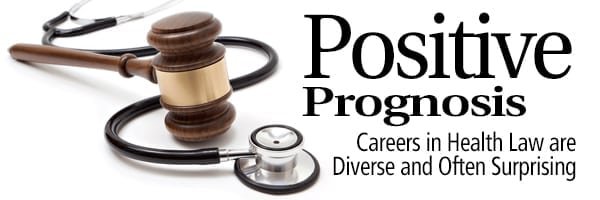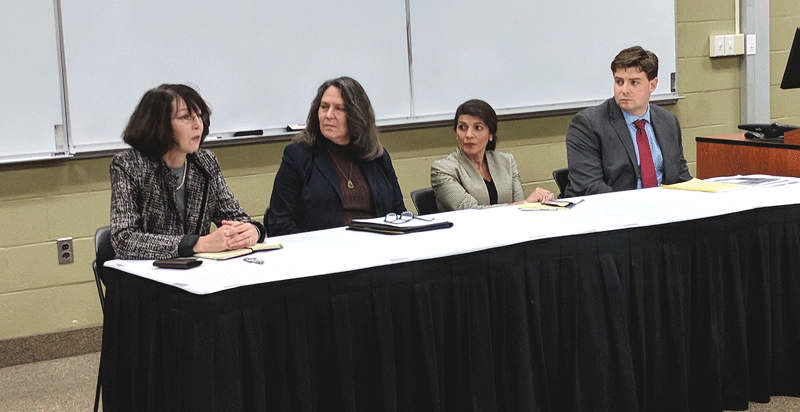
Careers in Health Law Are Diverse and Often Surprising
Positive Prognosis
 The field of law that focuses specifically on healthcare is diverse, challenging, and constantly changing, and that presents growth opportunities at a time when some fields of law are seeing job stagnation. But many law students aren’t aware of these possibilities, which run the gamut from malpractice litigation to end-of-life planning; from medical-records compliance to helping people navigate the complexities of the mental-health system. And those opportunities are only expected to keep expanding.
The field of law that focuses specifically on healthcare is diverse, challenging, and constantly changing, and that presents growth opportunities at a time when some fields of law are seeing job stagnation. But many law students aren’t aware of these possibilities, which run the gamut from malpractice litigation to end-of-life planning; from medical-records compliance to helping people navigate the complexities of the mental-health system. And those opportunities are only expected to keep expanding.
Barbara Noah says she took a winding path to her career as a law professor, one who specializes in the rapidly changing world of health law.
“When I graduated from law school, I was thinking more of the style of practice and the sort of things I’d like to do,” said Noah, professor of Health Law at Western New England University (WNEU) School of Law, during a recent panel discussion about health-law careers.
After graduating from Harvard Law School in 1990, she wasn’t interested in litigation, and instead went to work for a Washington, D.C.-based law firm with a strong focus on regulatory compliance.
“Our role was to counsel clients, which were mostly pharmaceutical and medical-device companies, on how to keep in compliance with the regulations issued by the Food and Drug Administration,” she explained. “It wasn’t about getting new drugs approved; these were already-approved products, and we were making sure clients were following appropriate safety rules.”
She found the field so interesting that she eventually transitioned into a long career, first at the University of Florida and since 2005 at WNEU, teaching the many facets of health law.
SEE: List of Law Firms
To name just a few of those, healthcare lawyers interpret the complex healthcare regulations and statutes that govern the administration of health services, advising hospitals, physicians, pharmaceutical companies, insurers, and other providers on issues ranging from licensing, reimbursement, and risk management to malpractice litigation and general corporate management.
One panelist at the WNEU event, Judith Feinberg Albright, who works for Devine, Millimet & Branch in Manchester, N.H., started her career as a paramedic before enrolling in law school and taking a particular interest in health law. She developed a secondary interest in litigation through moot-court experiences during those years, and now defends healthcare providers against malpractice claims in Massachusetts and New Hampshire.
“I see many people in health law with non-traditional pathways, people with some previous career in healthcare — like you see engineers and architects in intellectual-property law,” she noted. “It’s a pretty diverse group of folks.”
Some jobs are more unique than others. Deb Grossman, another panelist, serves as general counsel with Physician Health Services, an arm of the Massachusetts Medical Society that helps physicians deal with personal and behavioral-health issues and navigate their way back to work.
“Doctors don’t really like lawyers much; they see them as a threat of some kind,” Grossman said. “But I want to be supportive. I’ve been in different roles that were not always supportive, but now I’m in a very conciliatory position.”
After working for a large law firm earlier in her career, she explaned, she went looking for a lifestyle change, and took a job with the state handling the licensure of medical professionals, before taking on her current role.
“I became a much better lawyer,” she said, telling students gathered at the panel discussion that, yes, she made less money working for the state, “but what I gained in experience and autonomy as an attorney, I think was really invaluable.”
It’s just one example, Noah told BusinessWest afterward, of how a shifting healthcare field is cultivating many opportunities for lawyers that students might not hear about on a regular basis during their law-school years — which is why the panel was assembled.
“What’s included in the sweep of healthcare law is broader than people initially think; they think of medical malpractice or something to do with health insurance, but it’s a much broader field than people typically understand,” she said. “And a number of these aspects of health law are in flux right now, and they might be areas of growing demand for the purposes of careers.”
A Different World
One of those changing areas of the law is healthcare compliance — for example, how hospitals are complying with the privacy rules of the Health Insurance Portability and Accountability Act, or HIPAA.
“Although HIPAA has been around for quite a while, every hospital of any size has a compliance office that makes sure medical privacy requirements are being met,” Noah said. “And now with the switch to electronic medical records, it’s created a whole new set of questions for HIPAA in information sharing, and I’m hearing that data security is a big issue which impacts compliance.”
The second growth area concerns the overlap between elder law and health law, driven mostly by the aging of the Baby Boomer population. Not only are older Americans making plans for their estates, Noah said, but they’re becoming more keenly aware of their own mortality, and considering issues like advance care directives, healthcare proxies, and end-of-life preferences, such as do-not-resuscitate orders and decisions on nutrition and breathing assistance.

From left, Barbara Noah, Judith Fineberg Albright, Deb Grossman, and Dylan Mawdsley talk about their very different health-law careers at a recent panel discussion at WNEU School of Law.
“There are all sorts of questions, and more attention is being focused on them,” Noah said. “But there’s still a real reluctance to do much advance care planning until faced with a bad diagnosis. That’s an issue that’s going to need more well-trained attorneys in the future to reach this large and aging Baby Boomer population.”
The third big shift that could affect health law is, of course, the ever-changing Affordable Care Act, which has been threatened by the recent federal tax law that repeals its individual mandate.
“We’re keeping on top of how the Affordable Care Act is being changed, amended, and manipulated, and how that impacts the system of healthcare delivery. It’s a moving target,” Noah explained. “Without the individual mandate, if healthy people aren’t buying in anymore, the pool is sicker, and that drives up prices.”
According to Nick Sumski, an LSAT teacher for Kaplan Test Prep, health law is a compelling area of law because everyone has to touch the healthcare system at some point in their lives.
“Health law is such a big growth field with an incredible amount of opportunity, especially in the coming years,” he noted last month on the Kaplan website. “No one knows how it’s all going to work moving forward, and there is going to be a big demand for lawyers to help figure it out.”
Dylan Mawdsley, another panelist at the WNEU event, is assistant general counsel for the state Department of Mental Health, advising DMH staff in their decision making and compliance with laws, and representing the agency before probate and family courts.
He originally went to college as a political science major, but pivoted to law school afterward, starting his career in estate planning — right when the Great Recession hit, which was a bad time for that area of law. The work he does now, often serving as a liaison between doctors, patients, and the court system, is gratifying and presents a great deal of autonomy.
“I really feel like the work we do is good work,” he said, “helping people get treatment and services they wouldn’t otherwise be able to access.”
Meaningful Work
When Grossman was in law school, she recalled, she learned a lot about corporate law and litigation, but not much else, and certainly not what she’s doing today.
“This niche of work is very, very satisfying, it’s important work, and the schedule allows me to raise my kids,” she said. “Law students should know there’s a whole world of jobs out there, that aren’t typical law-firm, corporate types of jobs.”
Sumski said students shouldn’t feel like they have to pick any kind of specialization right away.
“Keep an open mind in those first-year classes; you might be surprised by the area of law that ultimately interests you,” he noted. “If you are interested in health law, however, you should take some introductory classes in the subject matter and see if a particular aspect of the field interests you. Health law is an incredibly broad field that touches on many different aspects of law. There’s a lot of opportunity in the area. The job market for lawyers is getting better, but it’s not great, so it makes sense to go into an area that is in demand.”
That demand, Noah said, is driven partly by the fact that health law is so interconnected, with so many moving parts.
“Any student who goes into health law is going to need a deep knowledge of the particular area they’re focusing on,” she noted, “but also a broad, contextual understanding of how the whole healthcare finance and delivery system works in this country — and it’s a very messy, complex, and inefficient system.”
And one that’s constantly changing, presenting plentiful opportunities for law students and career changers willing to think outside the jury box.
Joseph Bednar can be reached at [email protected]





